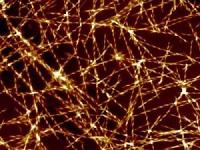 |
|
Magnified amyloid fibrils, the type of protein structures that are formed in Alzheimer's--Courtesy of Tuomas Knowles
|
U.K. researchers may have identified a catalytic trigger for the onset of Alzheimer's disease--a finding that could help doctors diagnose the disease earlier and potentially pave the way for a new class of drugs desperately needed to help treat the debilitating disease.
Scientists at the University of Cambridge's Department of Chemistry have mapped the brain pathway that produces abnormal proteins to pinpoint how oligomers--the toxic species that spread easily around the brain to cause the death of neurons--are formed.
"There are no disease modifying therapies for Alzheimer's and dementia at the moment, only limited treatment for symptoms. We have to solve what happens at the molecular level before we can progress and have real impact," Dr. Tuomas Knowles, lead author of the Cambridge study, said in a statement.
Amyloid fibrils, which clump together to form plaques, have long been thought to be the culprit behind Alzheimer's. But research published a decade ago by the Cambridge team, led by Christopher Dobson, suggested that something else might be behind the disease: toxic oligomers. The new research reveals how these oligomers work to cause neurodegeneration characteristic of Alzheimer's disease.
In a study to be published this week in the Proceedings of the National Academy of Sciences, the Cambridge team found that when a low but critical level of malfunctioning protein "clumps" form, a chain reaction is triggered that multiplies the number of these protein composites. This process creates clusters that contain a few protein molecules--the toxic oligomers that navigate through brain cells, killing neurons and ultimately causing loss of memory and other symptoms of dementia.
The researchers believe their findings are crucial to detecting, targeting and interfering with the molecular catalyst that underlies the pathology of the disease.
- here's the press release
- read more in the U.K. Huffington Post